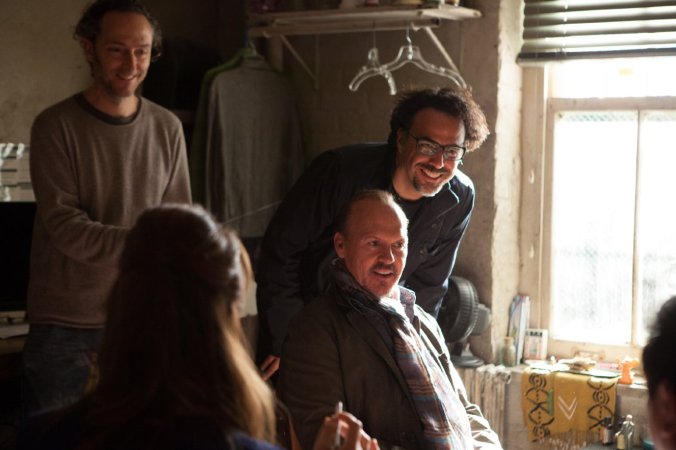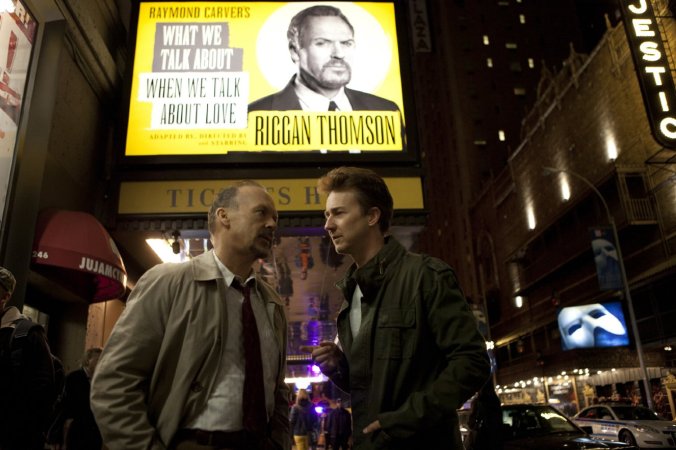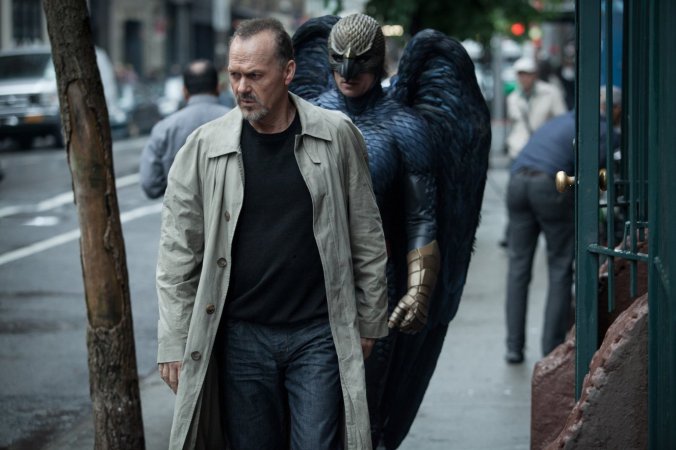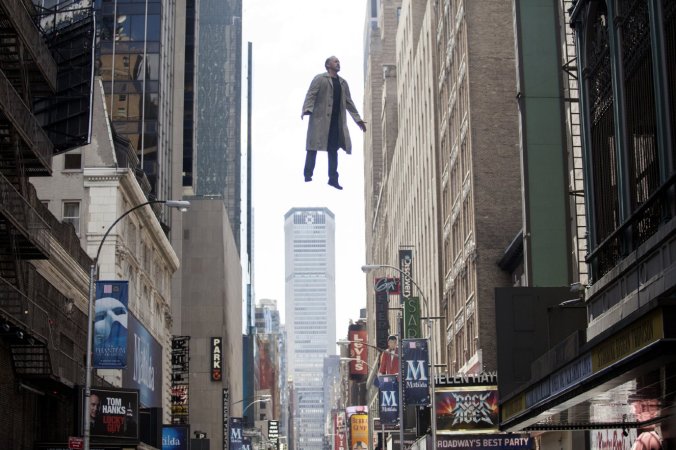The bottom line is “Who Cares?” as long as we get to see Michael Keaton give the performance of his career, then who cares what this film’s message is actually supposed to be.
In the beginning I wasn’t sure what to make of it…
As the opening frame which quite frankly is the only frame of “Birdman” in it’s entirety the first time we see Michael Keaton in his tighty-whities it’s from behind. His character, a formerly huge action movie star by the name of Riggan Thompson (can I please have that name for one day?), is sitting in the lotus position in his dressing room of a historic Broadway theatre, only he’s levitating above the ground. Bathed in sunlight streaming in from an open window, he looks peaceful but i’m I’m also wondering “What the hell is going on here?” But a voice inside his head, which serves as our film narration is growling, grumbling, and literally screeching at him at times, constantly about matters both large and small as he tries to take “flight” so to speak.
The next time we see Keaton in his tighty-whities in “Birdman,” he’s dashing frantically through Times Square at night, having accidentally locked himself out of that same theatre (it was an odd circumstance that any of us can get into) in the middle of a performance of a Raymond Carver production of ““What We Talk About When We Talk About Love” that he’s starring in, writing, and directing. He’s navigating through a river of gawking tourists, iPhone video sharers, food carts and street performers. But despite that chaos that surrounds him, Riggan seems purposeful, driven and–for the first time–oddly content. Hell, you would be too if you had to get back into the damn theatre and boy does he ever, through the front door in his tighty-whities no less!
Thank God there are some filmmakers that still take chances.
These are the extremes that director Alejandro Gonzalez Inarritu navigates with audacious ambition and spectacular skill in “Birdman”–the full title of which is “Birdman or (The Unexpected Virtue of Ignorance).” (Yes, I’m not exactly sure why the movie takes on that title and at that length). He’s made a film that’s both technically astounding, thanks to that one moving shot, yet emotionally complicated with multiple layers, it’s intimate (thanks to the St. James Theatre setting) yet enormous (thanks to taking the action to the rest of New York City at times, biting yet warm, satirical yet occasionally sweet. All about the life in entertainment in all it’s ugly glory. It’s also the first time that Inarritu, the director of ponderous downers like “Babel” “and “Biutiful,” actually seems to be having some joy in his movies, maybe because it’s about the making of entertainment that so few of us get to experience.
Let’s make that a ton of joy, with equal parts resentment and anxiety. “Birdman” represents a complete off the wall blast from start to finish, no matter how odd and off-putting that finish is. The gimmick here–and it’s a real doozy, and it works beautifully–is that Inarritu has created the sensation that you are watching a two-hour film shot all in one take. Working with the brilliant and inventive cinematographer Emmanuel Lubezki (who won an Oscar® last year for shooting “Gravity” and is the favorite to win his second in a row again), Inarritu has constructed the most delicate and dazzling high-wire act. And apparently, before shooting began, the director sent his cast a photo of Philippe Petit walking a tightrope between the World Trade Center towers as inspiration to what they were attempting to do. (That event is also being turned into a movie, because Hollywood can’t stop walking tightropes both metaphorically and in actuality)

Inarritu takes chances with “Birdman” and it’s not only the actors who are lucky enough to experience that here.
Through the impossibly long, intricately choreographed camera tracking shots on both dollys and hand-held, the camera swoops through narrow corridors, up and down tight stairways of the St. James and into crowded New York City streets. Shots vary from close ups for quiet one-on-one conversations in dressing rooms to huge panning shots which soar between skyscrapers for a moment of magical-realism flights of fancy when the title character “Birdman” really comes out and spreads its wings so to speak. In 2002, I made sure to see a small foreign language film called “Russian Ark” that took place in The Hermitage Museum in St. Petersburg, Russia which was imagined as one long tracking shot. That film had the benefit of a large museum to play in, “Birdman” does not, and takes advantage of their small intimate space.
A percussive and propulsive score from Antonio Sanchez (which was criminally rejected by the Academy and disqualified from consideration for the Oscar®), relies heavily on drums and cymbals, maintains a jazzy, edgy city-esque urban vibe throughout the entire film which allows it to plat a secondary character. This gimmick has been sold as one long continuous shot with no edits, but there are some edits there for sure. Sure, you can play it back on your DVR and look closely to find where the cuts probably happened (I have my suspicions), but debating where they happen takes much of the enjoyment out of it and takes away from the work of the film’s editors (again criminally unacknowledged by Oscar®).
Here’s to not being overlooked come Oscar® Sunday.
Beyond the actual moviemaking of this film comes the commanding performance from Michael Keaton in the role of a lifetime as Riggan Thompson, the washed-up actor he plays trying to regain his former glory he achieved as the fictitious winged action hero Birdman. The film follows the fraught early going of his Broadway debut which he believes is his last shot at greatness–although his on-screen alter ego doesn’t help much by voicing his fears and making him doubt himself incessantly. Yes, it’s knowingly amusing that Keaton, who peaked 20-plus years ago as the now legendary superhero “Batman,” is playing an actor who peaked 20-plus years ago as a superhero. Reality and clearly fantasy meet. Although I belive that it is Keaton’s Batman made by Tim Burton all the way back in 1989 should be considered is the definitive performance of that iconic superhero–but that’s neither here nor there. (God who would have thought that Keaton would have been able to pull that off from what we all know now from that franchise’s history)
The Golden Globe Award® winning script from Inarritu, Nicolas Giacobone, Alexander Dinelaris and Armando Bo is cleverly meta without being too cutesy and self-satisfied. They allow for Keaton to toy with his persona a bit–as well as acknowledge how comparatively quiet his career has been in recent years–but seeing him in seasoned form provides its own joy. He’s still hyper-verbal and playful and he can still be amusing and lacerating in his delivery, but there’s a wry wistfulness and even a desperation in the mix now that’s achingly poignant.
True Ensembles Make for Truly Unique Storytelling.
Also confronting his real-life reputation and stealing the movie is Edward Norton (Best Supporting Oscar® nominee) as Mike Shiner, the brilliant but infamously egotistical actor who steps in as Riggan’s younger co-star just as previews are about to begin on his labor-of-love production of “What We Talk About When We Talk About Love.” (Why Thompson chose to adapt this work of all things is never quite fully explained) Norton, who’s come with the baggage of being difficult and demanding over the years (again with the meta-ness with real life meeting fantasy), manages to find a distinctive balance between arrogance and sincerity with Shiner.

The “meta-ness” turns into reality with both Keaton and Norton playing fictionalized versions of themselves in “Birdman.”
Besides, they need each other, as they find in the days leading up to opening night. Everyone in this cast needs each other. Inarritu has amassed such a tremendous (and quite star studded) supporting cast and made ridiculous technical demands of them, (apparently they yet managed to film the movie in less than two months including rehearsals, and they filmed almost fifteen pages of dialog a day so they can continue the theme of a continuous shot throughout the entire movie) they all rise to the occasion and relished the chance to shine in this intimate tale.
Zack Galifianakis plays strongly against type as Riggan’s manager and the rare voice of reason in the middle of all this madness. Emma Stone (Best Supporting Actress Oscar® nominee) is adorable as Riggan’s world-weary, wise-ass daughter who also serves as his assistant. (She and Norton have crackling chemistry in a couple of crucial scenes.) Amy Ryan manages to make a splash with her very brief screen time as Riggan’s ex-wife; her character allows him to flesh out in fuller form and allows us to see both the selfish and the good in him. And Naomi Watts, who starred in Inarritu’s wrenching “21 Grams” (and got a well-deserved Oscar® nomination out of that role) gets to play both light and heavy moments as a neurotic fellow cast member (and girlfriend to Shiner). It’s powerfully clear that they all worked their asses of to make this complicated thrill ride look effortless. The result is one of the best times you’ll have at the movies this year–which might even be the best movie this year.

Is Riggan Thompson just as confused as we are watching ‘Birdman?” He’s definitely more tortured as his tormentor is a man in a freaking bird suit, feathers and all!
But What Is Birdman All About Anyway?
Like I said in the beginning of my review, Who Cares? Is it about redemption, individual-wise or career-wise? Is it about putting on a show? Is it about coming to terms with who you really are? There are so many questions to ponder here. To really enjoy the power of movies, then we should all be so bold to recognize interesting film-making when we see it. The story has some holes and the almost out of left-field ending doesn’t help the films case. But I l am telling you this film deserves praise for being so audacious in its production and performances. Where they meet is where you want to experience. This film won’t be liked by everyone, but should still be seen by everyone. It’s so out there that by taking chances on filmmaking, Inarritu allows the viewer to be taken on a wild ride of a production of a play (and a career hanging in the balance) along for a ride of a lifetime.
